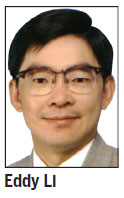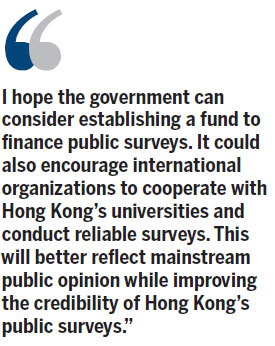HK needs more objective public opinion surveys
Updated: 2014-03-28 05:25
By Eddy Li(HK Edition)
|
|||||||
It is currently a crucial time for Hong Kong as it discusses the future of constitutional development - so any topic can arouse debate or controversy. Recently, the issue of whether there should be more objective public opinion surveys has becomes a contentious issue.
Earlier this month at a forum on Hong Kong's constitutional development in Beijing, Chinese People's Political Consultative Conference (CPPCC) National Committee member and Henderson Land Development Vice-Chairman Peter Lee Ka-kit criticized the Public Opinion Programme (POP) of the University of Hong Kong (HKU). He said the program's chief pollster Robert Chung Ting-yiu had frequently released surveys in favor of the opposition camp - surveys which were not scientifically based or objective.
With the media reporting more about this issue, the program chose to publish its latest survey on the popularity of the Chief Executive (CE) with its "original statistics". It was interesting to compare these statistics with the final conclusion of the survey.

The latest survey gave 47.5 (out of 100) to the CE for his performance, grading the CE as failing (50 being the cut-off score). Naturally, this grading impresses the public by saying the performance of the CE is unsatisfactory to most people. But by examining the "original statistics", we can clearly see that of the 998 respondents surveyed, 62 percent of them, 615 people, gave scores above the cut-off mark (50 or above), and only 383 (38 percent) scored the other way - with some 91 people giving a zero score. The final score of 47.5 was severely distorted by the zero marks. This was clearly unfair to the CE and his team.
In fact, the same statistics lead to different conclusions by using a different standard of reference. That is to say, if we use the number of people as a reference point, we are very likely to conclude that the majority of people (62 percent in this case) approve of the performance of the CE. I believe the public are sensible enough not to be easily misled once they have access to supporting data in each survey.
In the past, the POP of HKU revealed only the "average scores" - which contradicts a scientific approach to conducting surveys. So I don't think it is groundless for Peter Lee to criticize the survey.

Actually, the opportunity to see the original statistics previously had not been possible for many people, because the document could only be opened with expensive software. So if the POP wants to improve its credibility in future, then misusing data of any kind should be avoided.
This issue has brought attention to people conducting public surveys in Hong Kong. At present, there are hardly any other organizations which can publish their surveys on a regular basis as the HKU does. This puts the HKU program in a powerful position. Therefore, it becomes easy for the program to mislead people.
It is interesting to note that Taiwan has many public survey institutions which analyze statistics relating to politics, the economy and people's lives. Their surveys of public opinion tend to be more reliable and objective.
In recent years, many projects have been hindered by a small group of people often against the wishes of the majority. If more objective survey programs are established for collecting people's views, then obstacles to these projects could be reduced in future. Therefore, I hope the government can consider establishing a fund to finance public surveys. It could also encourage international organizations to cooperate with Hong Kong's universities and conduct reliable surveys. This will better reflect mainstream public opinion while improving the credibility of Hong Kong's public surveys.
The author is vice-president of the Chinese Manufacturers' Association of Hong Kong.
(HK Edition 03/28/2014 page9)